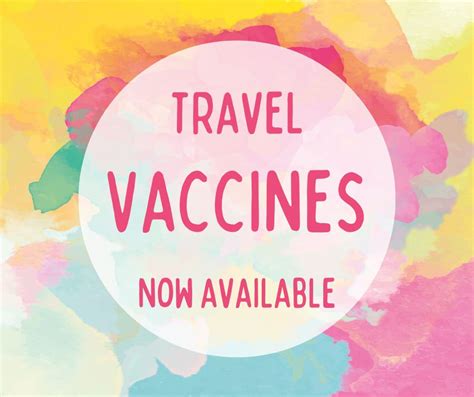Travel Vaccine Guide

Introduction to Travel Vaccines
When planning a trip abroad, it’s essential to consider the health risks associated with traveling to different parts of the world. One crucial aspect of travel preparation is getting vaccinated against diseases that are prevalent in your destination country. In this guide, we will walk you through the importance of travel vaccines, the different types of vaccines available, and how to determine which ones you need for your trip.
Why Are Travel Vaccines Important?
Travel vaccines are vital in protecting you against serious and sometimes life-threatening diseases that are common in certain regions. Vaccination can help prevent the spread of diseases, reduce the risk of illness, and even save lives. According to the World Health Organization (WHO), vaccines have been instrumental in controlling and eliminating many infectious diseases worldwide. By getting vaccinated, you not only protect yourself but also contribute to the global effort to prevent the spread of diseases.
Types of Travel Vaccines
There are several types of travel vaccines, including: * Routine vaccines: These are vaccines that are normally given in childhood, such as measles, mumps, and rubella (MMR) and diphtheria, tetanus, and pertussis (DTP). * Recommended vaccines: These vaccines are recommended for travelers based on their destination and the activities they plan to do. Examples include hepatitis A, hepatitis B, and typhoid fever. * Required vaccines: These vaccines are required by law for travel to certain countries, such as the yellow fever vaccine for travel to some countries in Africa and South America.
How to Determine Which Vaccines You Need
To determine which vaccines you need, you should consult with a healthcare professional or a travel clinic at least 4-6 weeks before your trip. They will assess your individual needs based on: * Your destination country * The length of your stay * Your planned activities (e.g., hiking, swimming, or visiting rural areas) * Your age and health status * Your vaccination history
🚨 Note: It's essential to be honest about your medical history and any medications you're taking, as some vaccines may not be suitable for people with certain health conditions.
Common Travel Vaccines
Here are some common travel vaccines: * Hepatitis A: Recommended for travel to countries with high or intermediate hepatitis A endemicity, such as Mexico, India, and parts of Africa and Asia. * Hepatitis B: Recommended for travel to countries with high or intermediate hepatitis B endemicity, such as China, India, and parts of Africa and Asia. * Typhoid fever: Recommended for travel to countries with high or intermediate typhoid fever endemicity, such as India, Pakistan, and parts of Africa and Asia. * Yellow fever: Required for travel to some countries in Africa and South America, such as Brazil, Ghana, and Nigeria. * Rabies: Recommended for travel to countries with high rabies endemicity, such as India, Thailand, and parts of Africa and Asia.
| Vaccine | Destination | Activities |
|---|---|---|
| Hepatitis A | Mexico, India, Africa, Asia | Eating or drinking contaminated food and water |
| Hepatitis B | China, India, Africa, Asia | Sexual contact, sharing needles, or getting a tattoo |
| Typhoid fever | India, Pakistan, Africa, Asia | Eating or drinking contaminated food and water |
| Yellow fever | Brazil, Ghana, Nigeria, Africa, South America | Mosquito bites |
| Rabies | India, Thailand, Africa, Asia | Animal bites or scratches |
Additional Tips for Travelers
In addition to getting vaccinated, here are some extra tips to help you stay healthy while traveling: * Practice good hygiene: Wash your hands frequently, especially before eating or drinking. * Avoid contaminated food and water: Stick to bottled or filtered water, and avoid eating undercooked or raw food. * Use insect repellent: Protect yourself against mosquito-borne diseases like malaria, dengue fever, and Zika virus. * Wear protective clothing: Cover yourself with long-sleeved shirts, long pants, and socks to prevent insect bites and scratches.
In summary, travel vaccines are a crucial aspect of travel preparation, and it’s essential to consult with a healthcare professional to determine which vaccines you need for your trip. By getting vaccinated and taking additional precautions, you can reduce the risk of illness and stay healthy while exploring the world.
What is the most important vaccine for travelers?
+
The most important vaccine for travelers depends on their destination and activities. However, hepatitis A and typhoid fever vaccines are commonly recommended for travelers to developing countries.
How long do travel vaccines last?
+
The duration of travel vaccines varies. Some vaccines, like hepatitis A, can provide lifelong protection, while others, like typhoid fever, may require booster shots every 2-5 years.
Can I get travel vaccines at a pharmacy?
+
Yes, some pharmacies offer travel vaccines, but it’s recommended to consult with a healthcare professional or a travel clinic to determine the best course of vaccination for your specific needs.